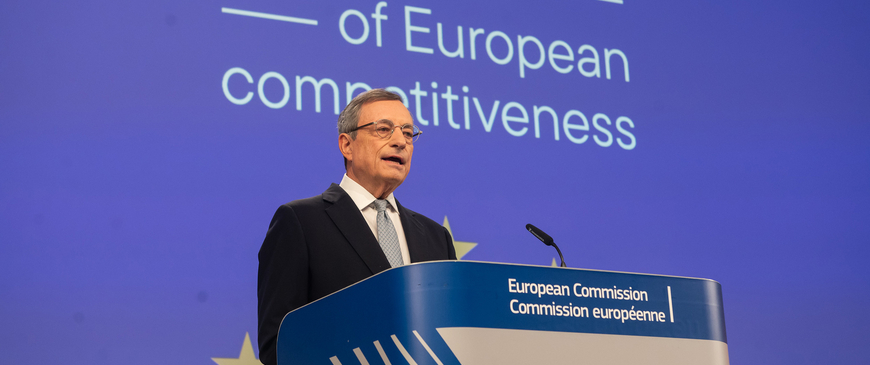
3 questions on the Draghi report on European competitiveness to Sander Tordoir
We asked Sander Tordoir, chief economist at the Centre for European Reform, for his first reactions to the Draghi report.
The long awaited report on European competitiveness by Mario Draghi was published just this week. Why was this report needed?
Draghi’s sombre diagnosis on the European economy is hard to dispute. Europe’s innovative capacity and business dynamism are declining compared to other advanced economies, while energy prices remain high. Intensifying state-led Chinese competition, geopolitical tensions and a continued reliance on imported energy, mean policy procrastination could indeed imply stagnation, or worse. The report should serve as a wake-up call to EU leaders who have long failed to confront Europe’s declining growth rate head-on.
What key message do you think the European Commission should take from this report?
Draghi rightly identifies Europe’s competitiveness challenge as being about boosting productivity. The report sensibly concentrates on boosting innovation through more joint decision-making for research funding, unblocking the EU single market and unburdening it from over-regulation while promoting capital market integration. His proposals to lower EU energy prices and enhanced EU co-ordination in defence are also useful, even if EU Member States remain reluctant to cede sovereignty.
One of Draghi’s key contributions is how it shifts the European narrative on industrial policy from a yes-or-no to a nuanced when-and-how debate considering the characteristics of each industry, its prospects, and its strategic value. In doing so, Draghi is advocating for a tougher EU line on China’s mercantilism, and closer alignment with the US, without succumbing to a protectionist turn.
I do not think the European Commission will be the key bottleneck here – President von der Leyen is aligning her political priorities with Draghi. The ball is in the EU Member States' court.
The report calls for an ambitious and substantial overhaul of European economic policy, that needs to be funded and managed by the EU. How can we achieve this?
Building a coherent industrial policy using Draghi’s blueprint will take time, but the EU could already enact several of his suggested measures. Brussels could act on its investigations into Chinese subsidies on a swathe of green tech products with sizeable but more targeted tariffs than the US. In doing so, the EU should protect critical, viable employment-rich sectors and promising infant industries whilst remaining within WTO rules – as Draghi recommends.
Draghi makes a compelling case for the EU to close its annual private and public investment gap of around 4.4-4.7% of GDP (€800 billion). These are largely existing targets. But scaling up the EU budget and redirecting its spending to innovation and strategic priorities has repeatedly proven politically impossible. So, some common debt may be unavoidable, but it remains controversial, even if Draghi suggests it should only be used for breakthrough innovations and cross-border energy infrastructure that can lift tax receipts.
Some politicians from Germany and other frugal countries were quick to reject the report because of the suggestion to jointly fund strategic investments. That criticism largely misses the real value of Draghi’s intervention, which is the blueprint it provides for a coherent EU growth strategy. This is what EU Member States should react to now instead of discussing worn-out pros and cons of common debt issuance. In fact, Germany, as the EU’s stagnating industrial heartland, could benefit more than most from Draghi’s proposals.
